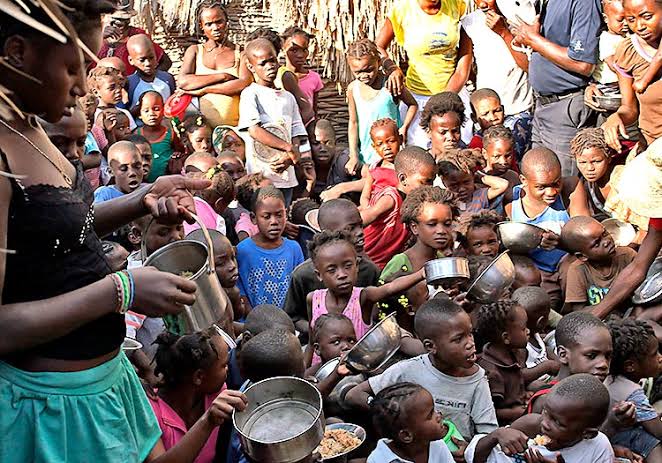Madagascar has finally been pushed into full-blown famine, with over a million people now being food insecured, Romazavas, the national dish of Madagascar, which consists greens, zebu meat, tomatoes and onions, mostly accompanied
by a portion of rice, have been replaced with locusts, mud, and raw cacti fruit.
Unlike previous famines, however, crop failures in Madagascar this time have little to do with pest outbreaks, natural disasters, or violence/war.
Its primary driver, for the first time in recorded history, is accelerating, anthropogenic and climate change.
Madagascar now joins the likes of Republic of Kiribati, an independent island nation in the central Pacific Ocean, the Sundarban and Republic of Maldives, the Indian subcontinent of Asia, as real-time case studies for what happens when climate change projections crystallize into reality. It sets up a precedence for what most people can expect if no major systemic action is taken now.
It also reveals the inconvenient reality of how vulnerable global food supply chains are and gives a glimpse at the catastrophic futures of a “business as usual” approach to sustainability.
It is now unequivocally clear that, in the last few decades, the Earth has entered a state of rapid global warming and climate change, driven primarily by human-based fossil fuel emissions.
This has, in turn, affected sensitive Earth systems and has pushed them into unfamiliar boundaries, yielding unfamiliar consequences as a result.
One example as predicted by the Intergovernmental Panel on Climate Change (IPCC) is a very likely increase in the number of compound extreme events since the 1950s.
For Madagascar, this means four years of continuous droughts that have decimated the nation’s food supply, It doesn’t help that Madagascar is already a region vulnerable to such events.
In 2019, it ranked 164 out of 189 in the Human Development Index, placing it as a region of “low human development”, this is lower than its ranking a decade earlier, three quarters of the population live below the poverty line, severely limiting access to resources.
Most importantly, roughly 70% of the population is employed in agriculture, with small holder farming being the predominant method.
This means that any circumstances that negatively affect these individuals affect the entire country, it is also small holder farmers that are at high risk from climate change-related events.
Without the support that normally arises from mass-scale industry farming (akin to “factory farms”), individuals mostly live from harvest to harvest, and have little resilience to even a single lost season, let alone multiple low-yield years.
The effects of climate change have been further exasperated in the area via unsustainable forestry practices.
By the mid-2010s, over 40% of Madagascar’s natural forest cover had been lost, primarily to agriculture, along with other reasons such as timber.
This is likely a contributor to the water scarcity the country is experiencing, given that forests play a key role in maintaining water supplies, and their absence can have serious consequences. With deforestation rates having increased to around 1% per year, and with increased forest fragmentation, there isn’t much in the way of mitigating climate change-related impacts.
What’s happening in Madagascar has a lot to do with what has happened (or more accurately, what hasn’t happened) in the decades after discovering climate change. Madagascar is only responsible for around 0.01% of global emissions, yet is in the front lines of the climate crisis.
The ugly reality is that climate change doesn’t necessarily care for proportionality. It doesn’t matter if the average American uses 17 times more fossil fuel energy than the average African, the effects will hit uncomfortably close to those in Madagascar and other vulnerable places nonetheless, this is a reminder of just how global the climate crisis truly is.
While Madagascar is facing the worst of it, premonitions have begun appearing through the planet.
In India, wheat yields have fallen by 5% despite adaptive measures, while Australia has seen potential yields in some areas drop by 27%, with high temperatures and reduced rainfall being primarily responsible.
Expectedly, regions with weak infrastructure and isolation, such as the Hindu Kush, have also experienced increases in extreme climate events.
In Colombia, a confluence of increased temperatures and unstable climatic patterns have reduced the available area for coffee production and now threaten global coffee supply chains.
Climate change is also expected to possibly negatively alter crop-pest relationships, which make it difficult to adapt to disease and pest outbreaks.
Pollination is also set to be impacted, with a likely mismatch between pollinator emergence and flowering of crops poised to reduce agricultural yields (insect emergence and flowering are both influenced by temperature).
This isn’t a Malagasy problem, or an African problem, nor a third world problem, this is simply a global problem, with global implications.
The only long-term solution is to move towards a carbon neutral global economy, which is built on renewable supplies of energy and highly efficient.
A move away from fossil fuels is a necessity, a post-growth economy is needed to ensure a sustainable future.
There is also a need for global, multilateral resource sharing frameworks in place, that will allow for richer nations such as the United States, EU, and other OECD nations to bridge the gap in wealth and resources with less economically developed countries (LEDCs)
Hunger season is coming, according to the description of UN on the impending humanitarian crisis in Madagascar.
We know how to prevent it from happening, and have the means of doing so, we must heed Madagascar’s warning, lest the season of hunger turn into a global norm.

